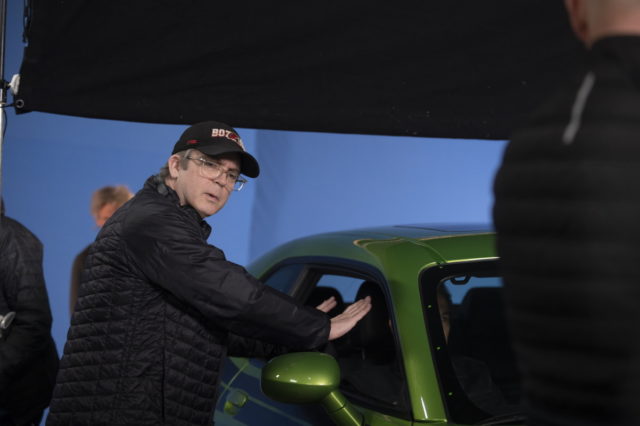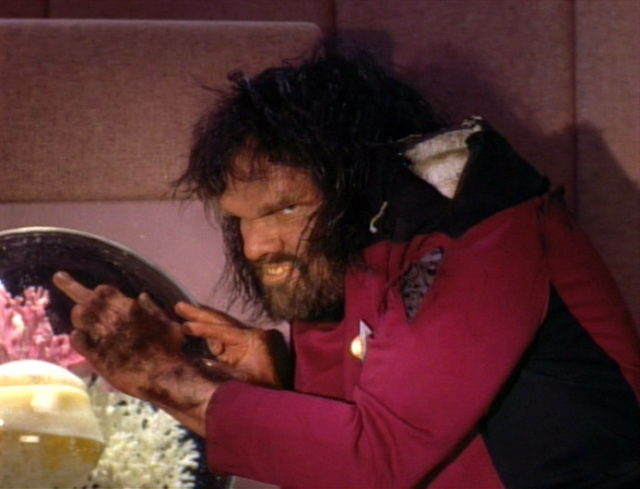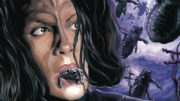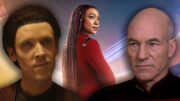Peabody Award winner and Emmy nominee Brannon Braga began his Hollywood career as a writing intern in 1990 on Star Trek: The Next Generation. He rose in the ranks to eventually become an executive producer and showrunner on both Star Trek: Voyager and Star Trek: Enterprise, with more Trek writing credits to his name than anyone. In recent years he has been working with Seth MacFarlane as a writer, executive producer, and director on Cosmos and The Orville. Braga’s latest project is as being the executive producer, co-writer, and director of the Hulu horror anthology film Books of Blood, based on the Clive Barker series of the same name.
TrekMovie had a lengthy chat with Braga to talk about the film, his time with Star Trek, and his other current projects. In this first part of our interview, we focus on Books of Blood, and how he brought his love of the horror genre into the writers’ room of Star Trek: The Next Generation.
Can you talk about putting together your latest project? What was it about Books of Blood?
Well, the love for this project for me originated in the mid-1980s—a few years before my internship with Star Trek: The Next Generation—when I first read them and went to Clive Barker’s very first American book signing at the A Change of Hobbit bookstore, a wondrous bookstore that used to exist that was just fantasy, horror, and science fiction. And he did a signing there and I was just a huge fan and I even had the chance to meet him. The books were just revelatory. And their originality and transgressiveness and all of those things Cliver Barker was and is.
As the years went on, I always wanted to do an anthology TV show, like The Twilight Zone. Black Mirror came out and is the best anthology show since Twilight Zone. And it made it possible for others to start doing them, and Books of Blood was always right there in my head as a great title, a great namesake, and a good collection of stories that hadn’t been filmed yet. Some of them had been made into movies like Hellraiser, which is a great movie, and Candyman was great, but others were not quite as successful in their execution.
So this film started as a TV series?
I want to do this as an anthology show. And it was eight years of meeting Clive, and Clive wanting to lend his namesake to the Books of Blood, which he didn’t think he would ever do. So yeah, this anthology was developed initially as a TV show that Hulu went for. Clive and I started developing stories, original stories from the books, and new stories he had been thinking about.
Then I brought in my very dear friend, Adam Simon, a brilliant writer to start developing scripts. But I realized these stories are like little sucker punches to the amygdala. They’re not movies, they’re short stories. And they have to be the right length. And Hulu really sagely suggested, “What if this was an anthological film and a possible series of films?” And I just knew in that instance, that was the best version of Books of Blood. And I knew what three stories we should do and it really came together fast at that point.
What’s it like working with Clive? Even though this is far from your first Hollywood project, can you control your own inner fanboy?
No, you can’t. It was a dream come true. We would meet like Tuesdays with Morrie, every Tuesday at three, I would go to Clive’s house and sit with Clive Barker for three hours. And we recorded these sessions. And I have hours and hours of recordings with Clive talking about horror, and the philosophy of horror and all this stuff. It’s just was just fascinating.
You’re sitting with Clive Barker; his artwork is all around you. And he’s brilliant. And he’s just fascinating to talk to. And you just know, I spent a lot of time just kind of listening. And we just became really good friends and we’re still developing stuff. We’d love to do another volume of this movie franchise. Hopefully, people check it out.
You talked about latching on to Books of Blood in the ’80s and in watching the film, it felt like it was evoking the style of classic horror films of that era and the ’70s. Was that the feel you were going for?
I was going after the filmmaking styles of the ‘70s, which arguably is the most important, transformative decade of horror in a lot of ways. You have to include Night of the Living Dead, which is the granddaddy of them all in that, which was actually the late ‘60s. I was shooting in the style I like to shoot in, which is kind of a classical style. A Hitchcock or Polanski type of style. I wanted it to look filmic. I wanted it to have color. A lot of things now have a monochromatic and drained-of-color look. So yes—while not creating a period piece because the movie takes place today and in the ‘90s—that is my style of filmmaking. You’re not the first person to say that and I’m surprised to hear it because I didn’t set out to make a 1970s-looking movie. I set out to make a classic-looking movie, and hopefully classy.
As a fan of the horror genre, you were responsible for some of the scarier Trek episodes, especially when you were a young writer on Next Generation with episodes like “Schisms,” “Phantasms,” “Genesis,” and the list goes on. Was it hard to push this envelope, or were you pushing against an open door as you pitched these ideas?
I was very lucky that my first writing job was on a show that could accommodate many types of stories. In fact, I always thought of Next Generation as an anthology show of sorts. You never really knew what you were getting every week. Sometimes it would be a Klingon political saga. Sometimes it would be a very intimate personal story. Sometimes it would be time travel. Sometimes it could be a horror story or a mind-bender. We were discovering a lot of it. And the same is true of The Original Series.
So they could accommodate my ideas. And my ideas were a little more Twilight Zone-y and scary. I think the first one I did was kind of a take on Invasion of the Body Snatchers, which was called “The Game,” and it turned out okay. I think from there they thought, ‘If he can make it work…’ The time loop story “Cause and Effect,” which was to me, a horror story as well. It was an existential horror story about people trapped in the same day. It felt like something Rod Serling would do. So if you can pull it off even if it sounds nutty.
Was there a line? Did you ever pitch something that was too much horror, too scary or gory?
I don’t recall having a story shut down. It was more like the way Michael Piller and Jeri Taylor and Rick Berman worked. If there was something good there, they would help you shape it, perhaps into something different and better. Like “Cause and Effect” started out as a slightly different idea involving people living the same day but seeing that same day from different perspectives in a Rashomon-type thing. It was a bit of a jumble, but as a writing staff we kind of narrowed it down into something more coherent.
So people weren’t shut down. Look, if they let me do “Genesis” where people turn into creatures, they weren’t going to shut down anything. That’s such a crazy episode.
How many members of the crew did Worf eat in that episode?
[Laughs] Well, there’s always that question. Every time there’s a space battle, I think about the kids in school and stuff. There are a thousand people on the ship and their families are there. Just imagine. Maybe some kids are like, “Cool, another space battle!” But most of them felt terrified. I think the only time we showed that was when the ship crashed in Generations and we cut to some families. It’s time to show what’s going on!
But how many did Jurassic Worf eat? I think thirteen people, maybe. I don’t remember.
While it wasn’t your original pitch, you wrote the teleplay for the ghost story “Sub Rosa.” Our Shuttle Pod podcast just did a watch-along for that episode, sort of making fun of it. Sorry, no offense.
I love it.
And when I just talked to Jonathan Frakes, who directed it, he brought that up, saying it wasn’t his finest hour. So, do you agree? And if so, was “Sub Rosa” just a bad idea, or did it just need more time to get it right?
Well, you always wished for more time. I’ve said this so many times that it’s starting to sound like an excuse, but when you’re doing 26 hours of Star Trek a season… Remember when “The Best of Both Worlds” cliffhanger happened? People were really upset that they had to wait three months. THREE MONTHS, not three years, like shows today. We never stopped making these things. So you always wish you had more time.
In the case of “Sub Rosa,” you never set out to make a bad episode. Frakes shouldn’t be blaming himself. It’s on the page. It was another attempt at a horror piece and a piece for Beverly Crusher. Sometimes I would like to take a character that like Crusher or Riker, who didn’t always get their own episodes, to be featured. And I wanted to do a kind of Henry James The Turn of the Screw vibe, and do science-fiction ghost story. The Riker episode I wrote “Frame of Mind,” was a mind-bending, what’s real/what’s not horror story. One worked, and one didn’t for whatever reason.
“Sub Rosa” probably felt cheesy and had a conceit that was not good. As I recall that there was a colony emulating Ireland or something. And it’s like, “What?” [laughs] But on the other hand, I can imagine that if you sufficiently explored our part of the galaxy there might things like that. It sounded cool at the time. But there are some really bad things in that episode. The worst line of dialogue that I ever wrote is in that episode.
What line was that?
I would have to look at it again, but the writing staff was merciless about making fun of me about this line. René Echevarria in particular would never let me forget it. It was something about the ghost saying telling Beverly that he can travel through some energy beam. [Editor’s note: The line is “The power transfer beam. I can travel along it.”] It’s just terrible. It’s terrible in context because by that point, the story has just fallen apart so badly you’re just like, “Jesus. What are we watching?” And it’s technobabble at its worst. You’re trying to tell a nuanced kind of ghost story and here comes some technobabble from the ghost and you’re just like, “Okay.” Anyway, I’m glad you’re scrutinizing episodes like that. Because it’s fun.
Books of Blood arrives Wednesday
Based on Clive Barker’s acclaimed and influential horror anthology Books of Blood, the original Hulu horror film directed by Brannon Braga takes audiences on a journey into uncharted and forbidden territory through three uncanny tales tangled in space and time. The film stars Britt Robertson, Rafi Gavron, Anna Friel, Yul Vazquez and Freda Foh Shen.
The Hulu original horror film Books of Blood will be available to stream on October 7. Here is the latest trailer.
More Braga to come
Check back later this week for the rest of our exclusive interview with Brannon Braga, where we discuss Star Trek: Voyager, Star Trek: Enterprise, The Orville, and Cosmos.
Check out more exclusive interviews at TrekMovie.com.











And that photo of Worf is exactly why it’s important to wear a mask in public.
And that picture of Dr. Crusher is why it’s important not to light your dead granny’s candles.
Wear a mask in public to protect others.
I wonder whether this obsession with the horror genre — definitely an acquired taste — is why Braga gets his bad rap, despite having delivered many impressive non-horror-inspired episodes.
Of the horror-inspired episodes mentioned above, most are awful: “Genesis” and “Sub Rosa.” “Phantasms” was scarcely better, outside of a bit of character development for Data. “The Game” worked well as a character piece for Wesley Crusher, but as a concept piece, it was middling. “Schisms” might have done better had they followed up on it.
The sole stellar entry is “Frame of Mind” (possibly “Cause and Effect,” too, but that one is overrated in my book; and it’s a stretch to call it horror in any event).
Ironically, the best horror episodes, “Q-Who” and “Conspiracy,” were not penned by Bragam.
“I wonder whether this obsession with the horror genre — definitely an acquired taste — is why Braga gets his bad rap”
No, no, no. His bad rep is entirely due to his blatant disregard for character consistency, canon and consequences, most pronouncedly on Voyager. RDM famously called him out on that, and that was his long term writing partner! Because of that, Braga worked best in a non-executive writer position constrained by more disciplined writers. When he got the keys for the car with Enterprise, it all went down-hill! If “art thrives most under limits” was ever true, then for Braga! That’s why a quasi-anthology, short-form series for crackpot ideas like Short Treks is perfect for him.
“Genesis” is worthwhile for seeing Barclay as the Man-Spider and Riker as a cave man.
not to mention Caveman Riker clearly flipping ppl off and the scene lingering on that for a moment LOL. That was almost Family Guy levels of ‘screw the censors’ awesome lol
Call me crazy, but after all that I’ve seen (had to see) in the past two years, I’m ready for some new Braga Trek! Maybe a Short Trek? The experimental, off-brand, short form and (most importantly for Braga) self-contained format seems perfect for him!
Granted, for every “Frame of the Mind” he delivered a “Threshold” but in the world of episodic Trek that still meant his contribution was a net positive since his episodes rarely shot down a whole series or story/character arc (TATV being one infamous exception) but nobody else delivered on his kind of hard scifi, high concept Trek that successfully married the show with The Twilight Zone!
Star Trek should do the Black Mirror approach.
It should, and I hope we still get to see a full-fledged live action anthology show (maybe with CGI sets to keep the costs down? At least the lack of need for a regular cast would counter-balance that). Just without Bryan Fuller’s involvement please ;)
You do need a cast for an anthology series. You actually need to completely recast for each episode (unless you have the same actors playing different roles each time). Of course, I don’t know how Hollywood contracts work but I could image that if you’re cast to play the lead role in a single episode of say a 10-episode season, you may actually earn more than 1/10 of the money they would pay you for the full season. So booking completely new actors for each episode might actually be more expensive than having a regular cast.
My brother works in a production company. Obviously it’s not acting, but he could earn a lot more per day if he went freelancing for different productions than in his regular (long-term employment) job. So basically, he’s trading a lower (but constant) income for not having to hunt for a new (better paying) job constantly.
VS, Braga’s observation that TNG and TOS were anthology shows is really key here.
It’s a real insight about the nature of episodic Trek series may not only explain why they have been so durable on rewatch, but also may be another important explanation about why the new Trek serial live-action series have struggled so much with writers conflicts and coherence.
Tiger2 wrote on another recent thread that what he likes about LDS, and has been missing in Discovery and Picard, is that sense of wondering what the family/ensemble will be up to or bump into each episode.
Picard and Discovery have promised surprise and wonder and all sorts of different things, but the serial format and heavy promotion aren’t building towards the same kinds of surprise and delight. Mystery boxes with dangling “red-herring” plot threads just aren’t working.
So, I agree, hopefully SNW, LDS and Short Treks can continue the anthology within a known ensemble and context model, and Discovery and Picard can lean into true novel series type serialization.
I’m not a horror fan but Star Trek could be a horror show. Not Steven King level horror but creepy enough.
Q could be a way to unite both Prime and Kelvin Timelines. The story shows how the death of one person (George Kirk) impacts the flow of history. The question that remains, should they be united at all?